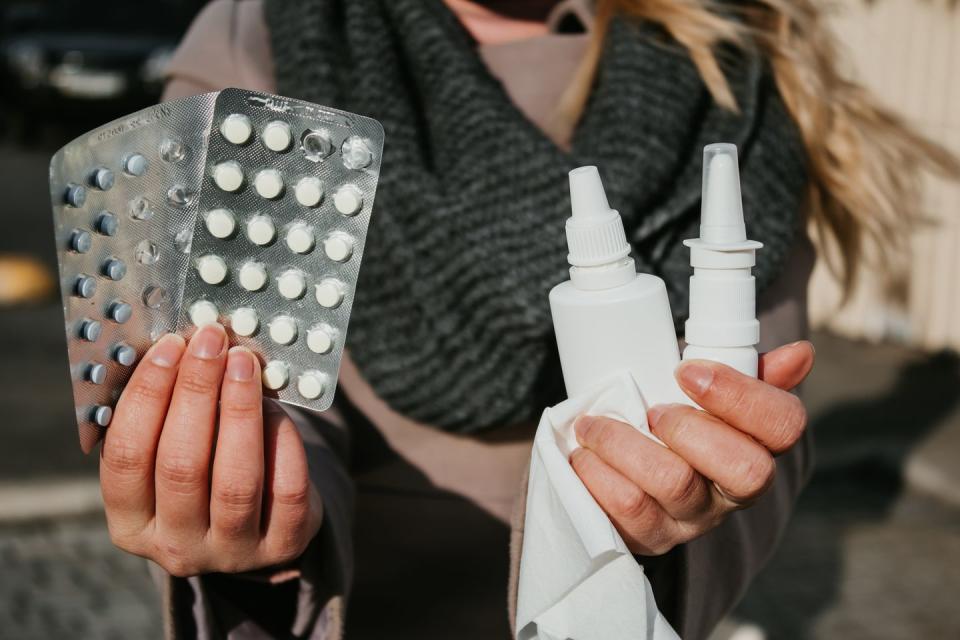Should you consider the hay fever injection?

If you're plagued with severe sniffles, sneezing, watery eyes and an itchy throat as soon as warmer weather arrives – and medicines and nasal sprays don't give you any reprieve – the hay fever injection could be the solution you're looking for.
As anyone who suffers from acute bouts of hay fever will tell you, this pesky pollen allergy can be all-consuming and make life extremely difficult. There's no cure for the condition, also known as allergic rhinitis, so treatments are the only way to keep symptoms in check.
To help you breathe easy this year, we spoke to Dr Seth Rankin, founder of London Doctors Clinic, and pharmacist Anshu Kaura of LloydsPharmacy, to explain how the hay fever injection works, reveal the risks associated with it, and share alternative treatment suggestions:
What is hay fever?
Hay fever is an allergic reaction to pollen. Around 10 to 15 per cent of Brits are afflicted at different stages of the year, depending on the type of pollen they're allergic to. Tree pollen allergies are triggered between March and May, while grass pollen occurs between May and July, and weed pollen allergies are activated between June and September.
Hay fever is the same as any other allergic response: your immune system identifies a foreign substance entering the body and attempts to remove it – initiating an inflammatory response. In the case of hay fever, the foreign body is pollen, which is harmless.
While 'defending' your body from the pollen, your immune system triggers a cascade of cold-like symptoms that range from frequent sneezing and coughing to severe exhaustion and sickness. Other common hay fever symptoms include:
Runny or blocked nose
Red watery eyes
Itchy throat, mouth, nose, eyes or ears
Wheezing
Tight chest
Loss of smell
Antihistamine tablets, nasal sprays and eye drops are available on prescription and over the counter to treat the symptoms of hay fever. However, around two thirds of sufferers find their symptoms do not respond to these treatments, and this is where the hay fever injection comes in.

Can you get a hay fever injection?
The hay fever injection, called Kenalog, is still officially licensed for the treatment of severe hay fever in the UK, but it's only available in private clinics. It contains triamcinolone acetonide, which belongs to a group of medicines called corticosteroids (steroids). 'Steroids are some of the most powerful anti-inflammatory medications available,' says Dr Rankin. 'They are used to treat a variety of conditions in which the body's immune system gets out of control, including asthma and rheumatoid arthritis.'
The NHS has determined that any potential benefits associated with administering a steroid injection for hay fever do not outweigh the risks. Steroid tablets (such as prednisolone) are occasionally prescribed for hay fever, but for no longer than 10 days. The longer you take them, the more likely it is you'll experience side effects such as weight gain, difficulty sleeping, and mood changes such as anxiety and depression. Steroid nasal sprays or drops (containing betamethasone and fluticasone) are also available on prescription, but shouldn't be used for more than four weeks.
Does the hay fever injection work?
There is scientific evidence that the hay fever injection is effective. In a randomised, double-blind, placebo-controlled trial from 1972, the hay fever injection was administered to 97 people with severe symptoms of hay fever. After 10 days, symptoms had improved or resolved in 94 per cent of the patients.
'A single dose is likely to relieve hay fever symptoms,' a Drug and Therapeutics Bulletin (DTB) concluded in 1999, 'but it is unclear for how long any benefit is likely to last, what unwanted effects might develop and how it compares with standard therapy'. The bulletin recommended against the hay fever injection 'until there is clear evidence of its advantages over other hay fever treatments'.
In 2019, a fresh review of the hay fever injection was prepared by the UK Medicines Information. 'Despite the likelihood that a single injection of Kenalog will relieve hay fever symptoms, there remains uncertainly about the efficacy and safety of repeated administration,' the authors wrote. 'There is a paucity of comparative studies and no new data on Kenalog have been published to change the conclusions of the DTB review in 1999 that this product should not be used.'

How does the hay fever injection work?
The hay fever injection works by temporarily suppressing your body's immune response for long enough to relieve symptoms. The steroids are injected into the buttock – known as an IntraMuscular (IM) injection – depositing a low dose directly into the muscle. They slowly leak into the bloodstream over the course of three weeks.
How long does the hay fever injection take to work?
Once the injection is administered, the effects last for a minimum of three weeks, with many people experiencing relief from symptoms that lasts the entire season. Usually one dose of the hay fever\ injection, equivalent to 40mg triamcinolone acetonide, is enough. It's not recommended that anyone have more than two injections per hay fever season.
How much does the hay fever injection cost?
The hay fever injection isn't available on the NHS, and it certainly isn't cheap. Generally, each 40mg dose will set you back upwards of £75, though it varies from clinic to clinic. Often the price covers the consultation too, but it's worth checking before you book.
Hay fever injection risks
Before you look to the hay fever injection as a remedy for severe hay fever symptoms, it's worth familiarising yourself with the risks and potential side effects:
• Hay fever injection side effects
Taking steroid medication is not without risks. It's possible to experience short- and long-term side effects from the hay fever injection, such as swelling, breathing difficulties, itchy skin, abdominal pain, raised blood pressure and raised blood sugar, among others. 'Before anyone agrees to a steroid treatment, they should be made explicitly aware of the potential side effects, but it's also good to remember that they are relatively rare,' says Dr Rankin.
• Hay fever injection persistent side effects
While the hay fever injection is more convenient than taking tablets, if you're unlucky enough to suffer side effects, you'll be stuck with them for longer, says Dr Rankin. 'Once you've had the injection, there's nothing that anyone can do to stop the steroids leaking into your bloodstream,' he says. 'If you do suffer any side effects, they may last for up to three weeks.' Your immune system will also be suppressed during this time, leaving you more at risk of infection.
• Hay fever injection and underlying medical conditions
Steroids, such as the hay fever injection, can exacerbate existing medical conditions – such as diabetes, stomach ulcers, and infections – and interact with certain medications, like aspirin and ibuprofen. It can also interfere with certain lab tests to produce false results. If you're thinking about getting the hay fever injection, speak to your GP or a qualified medical professional first – they'll help you make an informed decision.
Hay fever injection benefits
It's not all doom and gloom. There are some potential benefits associated with the hay fever injection:
✔️ The hay fever injection is convenient
No one can deny the appeal of quelling hay fever symptoms with a one-off shot. 'Hay fever sufferers generally only require one injection to reduce symptoms for the entire season,' says Dr Rankin. 'Compared to taking tablets every day, that's very convenient.'
✔️ The hay fever injection is less potent than steroid tablets
Theoretically, a lower dose means a reduction in the severity of potential side effects. 'Each injection is roughly equal to the steroid dose from taking a 5mg tablet of Prednisolone every day for around three weeks,' says Dr Rankin. 'It does not have to go through the liver or the digestive system, so you can administer a slightly lower dose than the tablet form.'
✔️ The hay fever injection can be effective
Some people report significant improvements in their symptoms after having the hay fever injection. 'For severe sufferers, life can be seriously disrupted by hay fever,' says Dr Rankin. 'Untreated, hay fever has been shown to reduce students' exam results by between five and 10 per cent. Patients report feeling unwell or exhausted for several months at a time.'
Can you permanently get rid of hay fever?
Unfortunately, there's no cure for hay fever. The only way to control the condition is to limit your exposure to pollen and treat symptoms with topical and oral antihistamines, nasal steroids and eye drops. Those who experience severe hay fever each year may be a candidate for immunotherapy, which involves being exposed to small amounts of pollen to help build up immunity.
'This form of therapy is a long-term treatment option that helps prevent allergy symptoms from occurring in the first place or at least reduce the severity of the symptoms,' says Kaura. 'The best time to start hay fever immunotherapy is ahead of the peak pollen season, which typically takes place March until July. Patients receive small doses of treatment, over the course of three to four months, helping gradually build up immunity.'
Immunotherapy can be administered in the form of an injection, known as systemic injection immunotherapy (SIT), or as a tablet that dissolves under your tongue, known as sublingual immunotherapy (SLIT). Over time, it reduces the severity of your immune system reaction, which results in milder symptoms. Immunotherapy is a slow process – to achieve long-term pollen desensitisation, usually three years of treatment is required.
'Immunotherapy isn't always safe for everyone, which is why it's important to seek advice from your GP first and if you do decided to proceed, seek the treatment from somewhere safe and reputable,' says Kaura. 'For people who can’t seem to shake symptoms despite trying lifestyle changes and over-the-counter medicine – their GP may refer them for immunotherapy, if suitable.'
Does hay fever improve with age?
In much the same way that allergies like hay fever can develop in adulthood, they can also dwindle as you age. Many people find their hay fever symptoms become less severe as they get older – around half of people report improvements in symptoms, and a lucky 10-20 per cent find their symptoms vanish entirely. A study by University Hospital in Sweden concluded that hay fever was most likely to disappear when people reach their fifties.
Last updated: 21-04-2021
You Might Also Like


